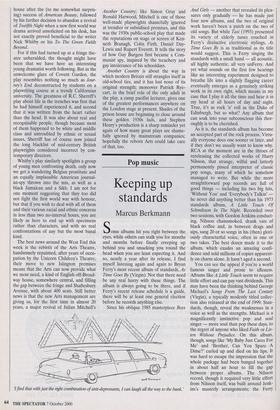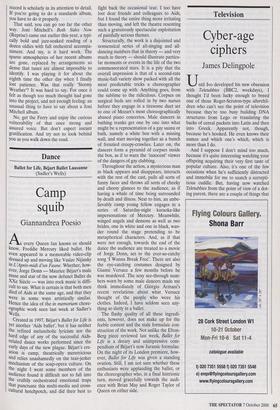Pop music
Keeping up standards
Marcus Berkmann
Some albums hit you right between the eyes, while others can stalk you for months and months before finally creeping up behind you and smacking you round the head when you are least expecting it. And so, nearly a year after its release, I find myself listening again and again to Bryan Ferry's most recent album of standards, As Time Goes By (Virgin). Not that there need be any real hurry with these things. The album is always going to be there, and if Ferry's recent release schedule is a guide, there will be at least one general election before he records anything else.
Since his oblique 1985 masterpiece Boys Ifind that with just the right combination of anti-depressants, I can laugh all the way to the bank' And Girls — another that revealed its plea- sures only gradually — he has made just four new albums, and the two of original work haven't been a patch on the two of old songs. But while Taxi (1993) presented its variety of elderly tunes couched in Ferry's distinctive electronic stylings, As Time Goes By is as traditional as its title would suggest. This is Ferry singing the standards with a small band — all acoustic, all highly authentic, all very unFerry. And yet what sounds on the first few hearings like an interesting experiment designed to breathe life into a slightly flagging career eventually emerges as a genuinely striking work in its own right, which means in my case that I play it all the time and hear it in my head at all hours of day and night. True, it's as rock 'n' roll as the Duke of Edinburgh, but so what? Any album that can soak into your subconscious this thor- oughly is to be cherished.
As it is, the standards album has become an accepted part of the rock process. Virtu- ally everyone does one sooner or later, and if they don't we usually want to know why. RCA at the moment are in the throes of rereleasing the collected works of Harry Nilsson, that strange, wilful and latterly permanently pissed interpreter of classic pop songs, many of which he somehow managed to write. But while the more straightforward pop records are full of good things — including his two big hits, `Without You' and 'Everybody's Talkin' he never did anything better than his 1973 standards album, A Little Touch Of Schmilsson In The Night. Recorded over two sessions, with Gordon Jenkins conduct- ing, Nilsson chainsmoked, drank vats of black coffee and, in between drags and sips, sang 20 or so songs in his (then) glori- ously characterful voice, often in one or two takes. The best dozen made it to the album, which exudes an amazing confi- dence and sold millions of copies apparent- ly on charm alone. It hasn't aged a second.
You can see the appeal if you're a world famous singer and prone to idleness. Albums like A Little Touch seem to require little effort and can pay vast dividends. This may have been the thinking behind George Michael's Songs From The Last Century (Virgin), a typically modestly titled collec- tion also released at the end of 1999. Stan- dards, though, reveal the weaknesses in a voice as well as the strengths. Michael is a magnificently instinctive pop and soul singer — more soul than pop these days, to the regret of anyone who liked Faith or Lis- ten Without Prejudice. On this album, though, songs like 'My Baby Just Cares For Me' and 'Brother, Can You Spare A Dime?' curled up and died on his lips. It was hard to escape the impression that the whole package had been bunged together in about half an hour to fill the gap between proper albums. The Nilsson record, though it required very little effort from Nilsson itself, was built around Jenk- ins's masterly arrangements; the Ferry record is scholarly in its attention to detail. If you're going to do a standards album, you have to do it properly.
That said, you can go too far the other way. Joni Mitchell's Both Sides Now (Reprise) came out earlier this year, a typi- cally bold and jazz-soaked reading of a dozen oldies with full orchestral accompa- niment. And my, is it hard work. The sparse atmospherics of her recent albums are gone, replaced by arrangements so dense that tunes are almost impossible to identify. I was playing it for about the eighth time the other day when I finally lost patience. Was that really 'Stormy Weather'? It was hard to say. For once it felt as though too much thought had gone into the project, and not enough feeling: an unusual thing to have to say about a Joni Mitchell album.
No, get the Ferry and enjoy the curious vulnerability of that once strong and assured voice. But don't expect instant gratification. And try not to look behind you as you walk down the road.



















































































 Previous page
Previous page